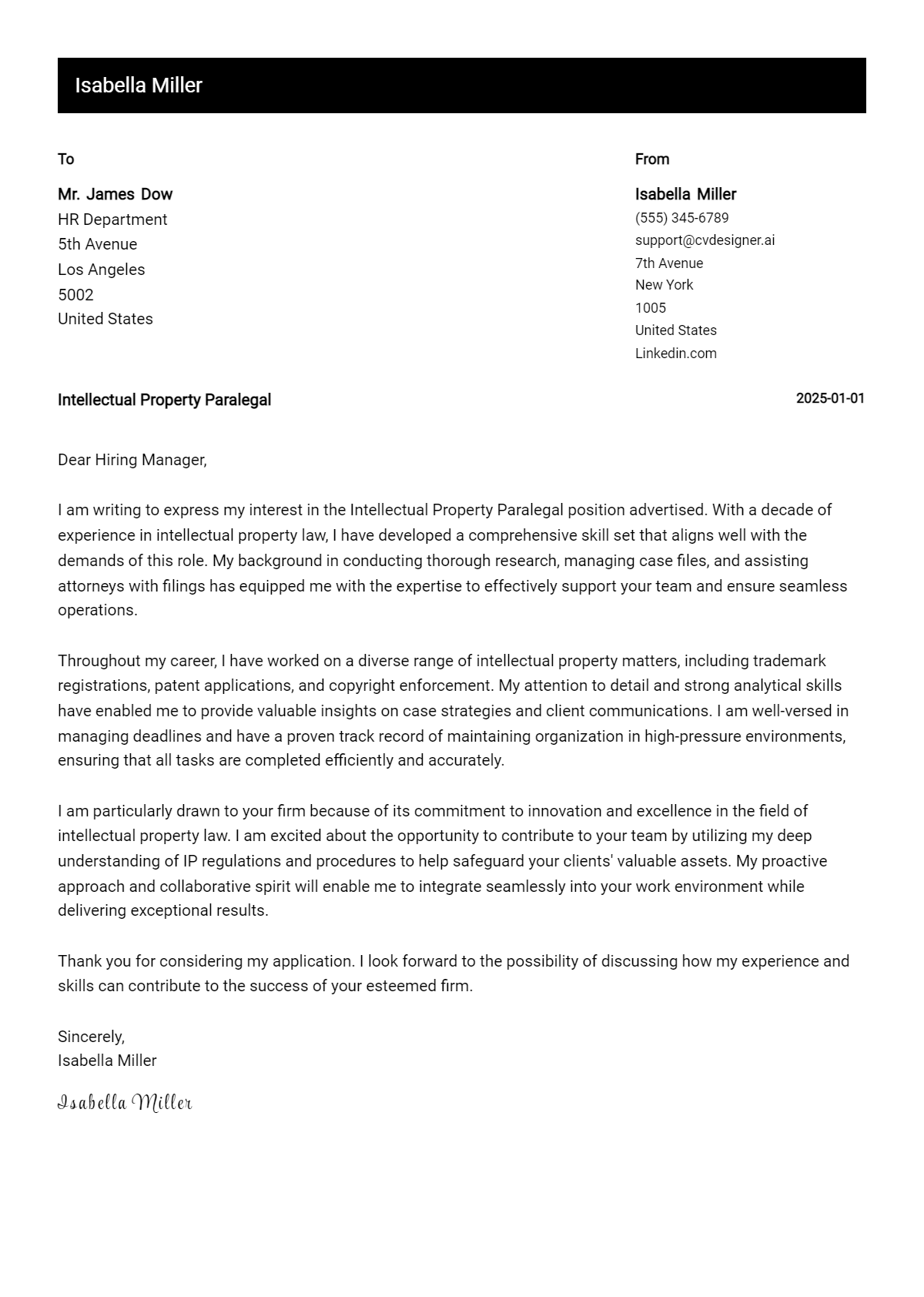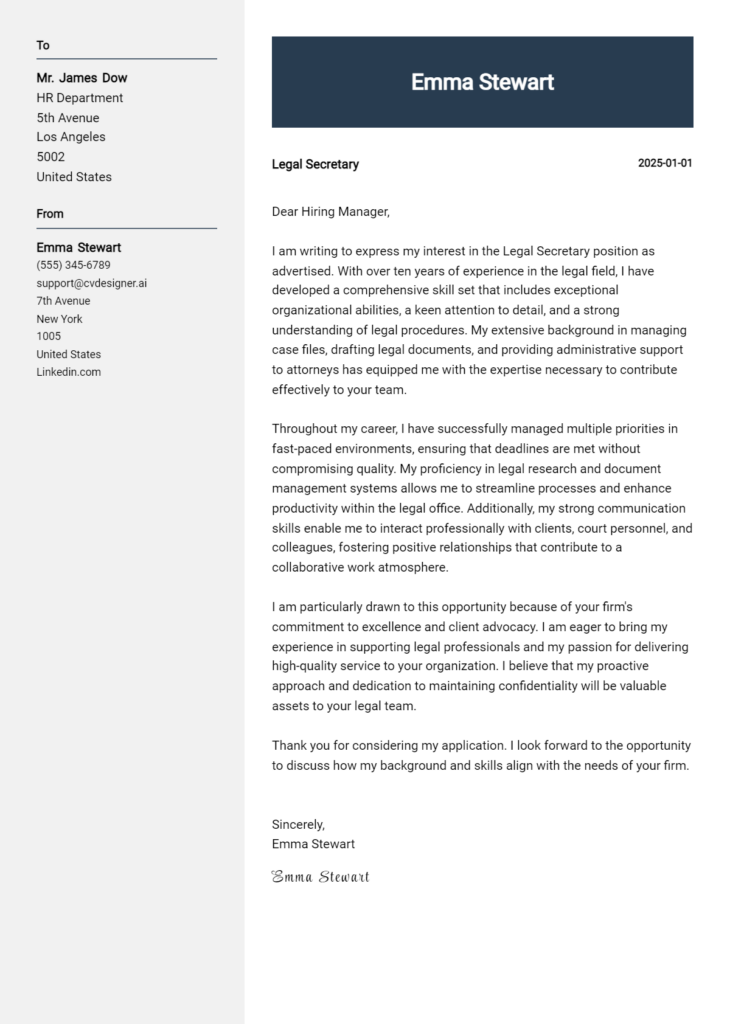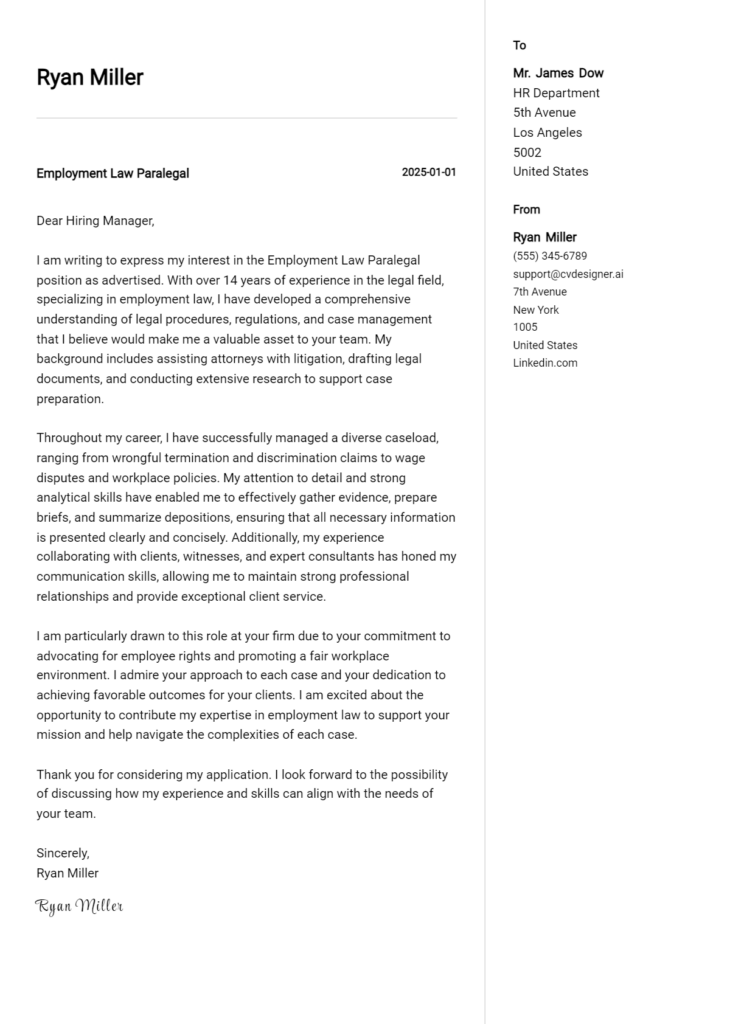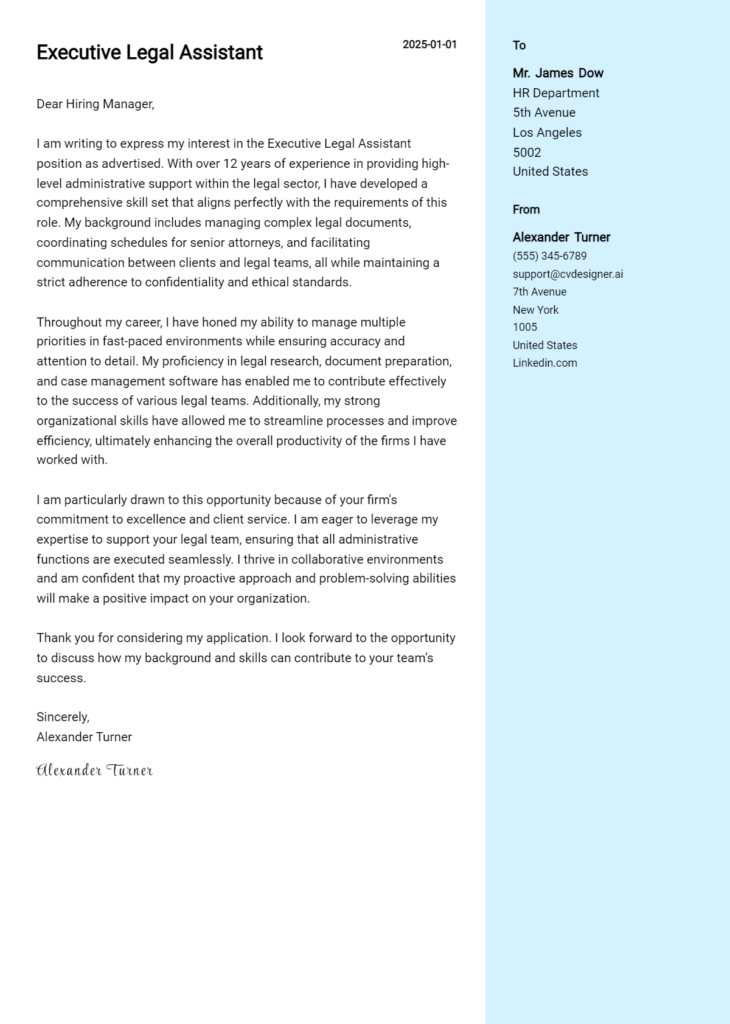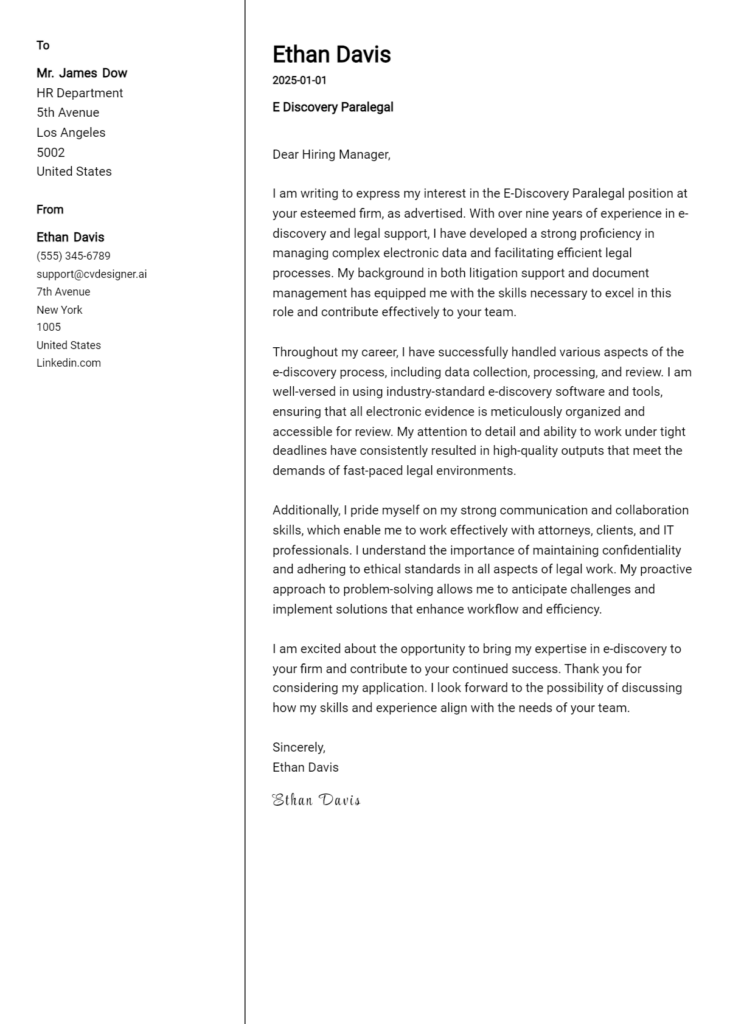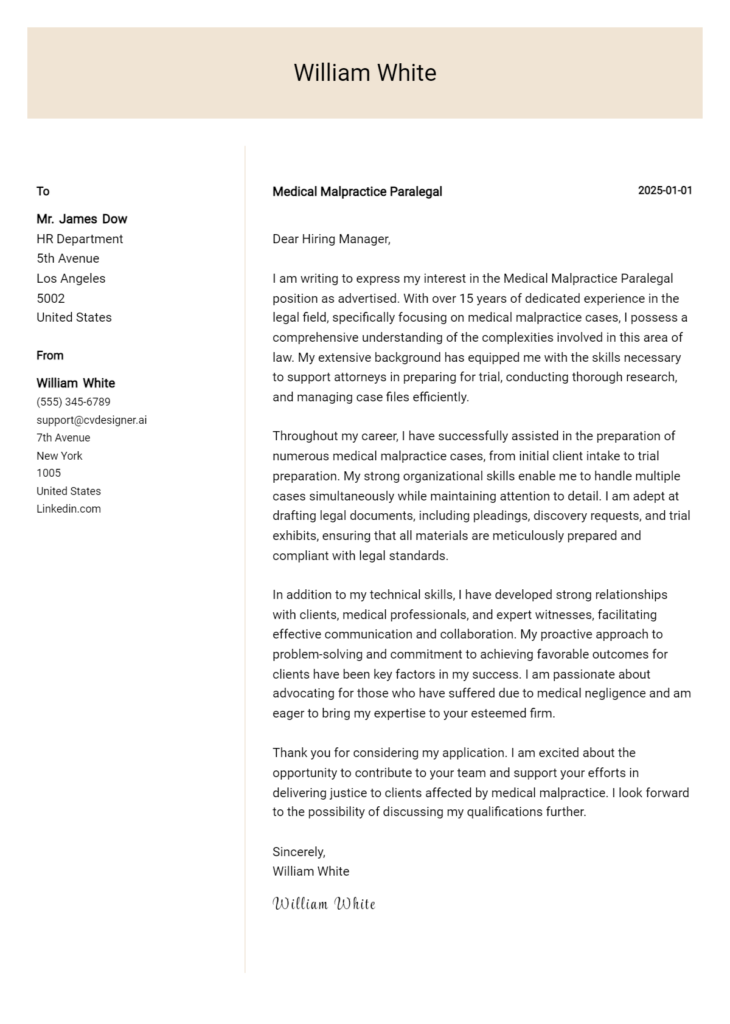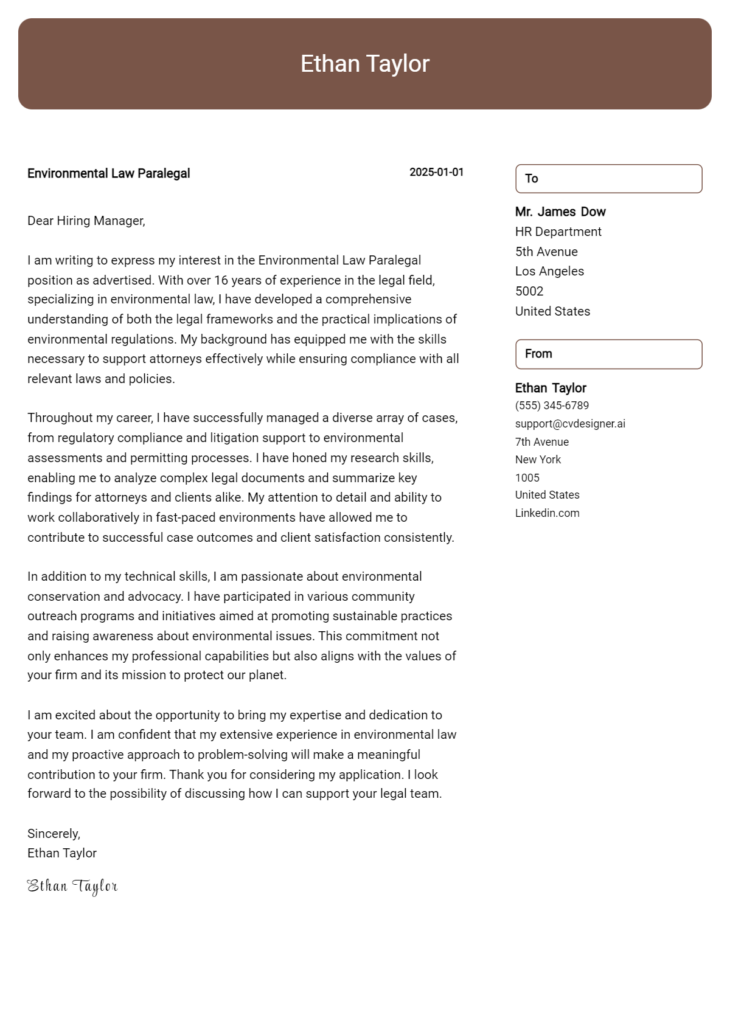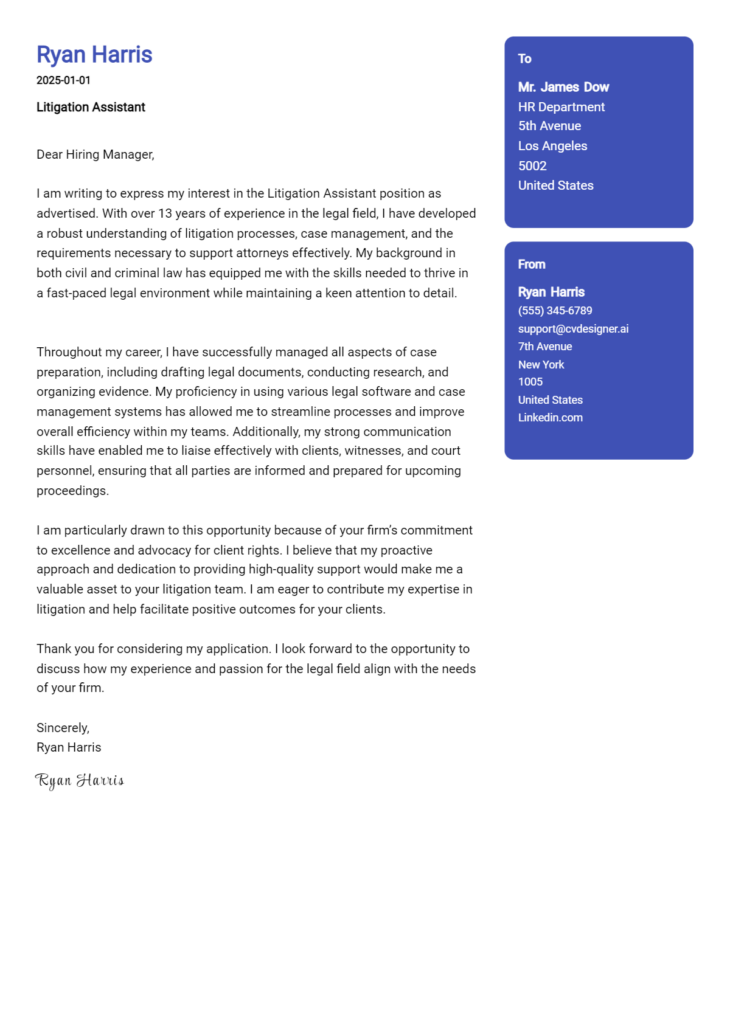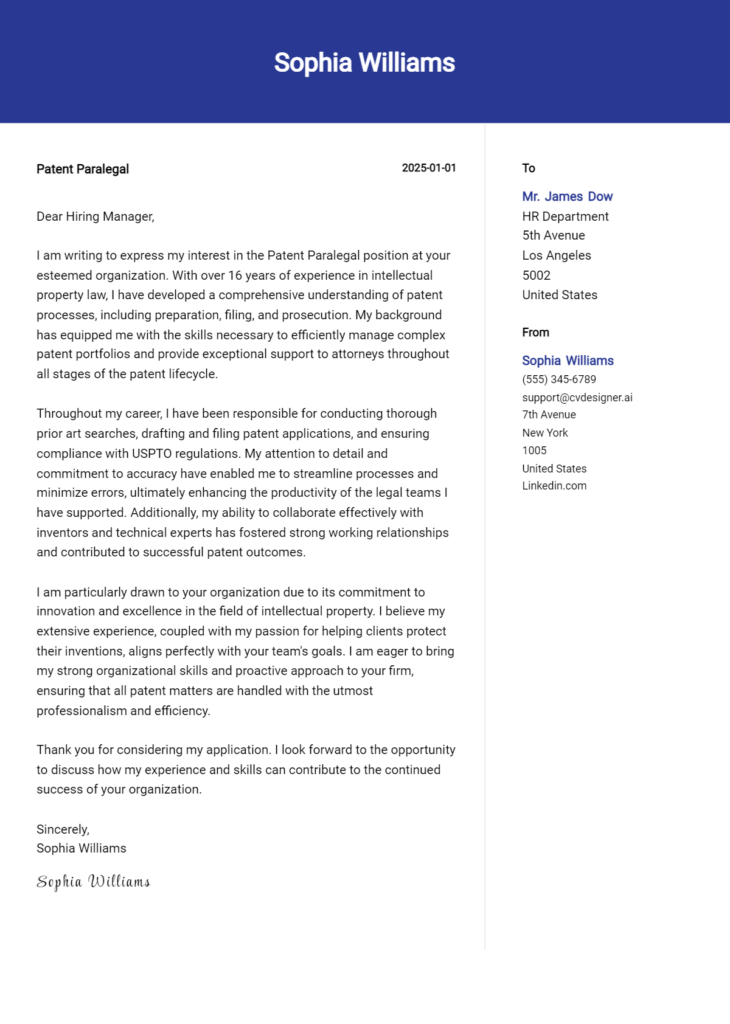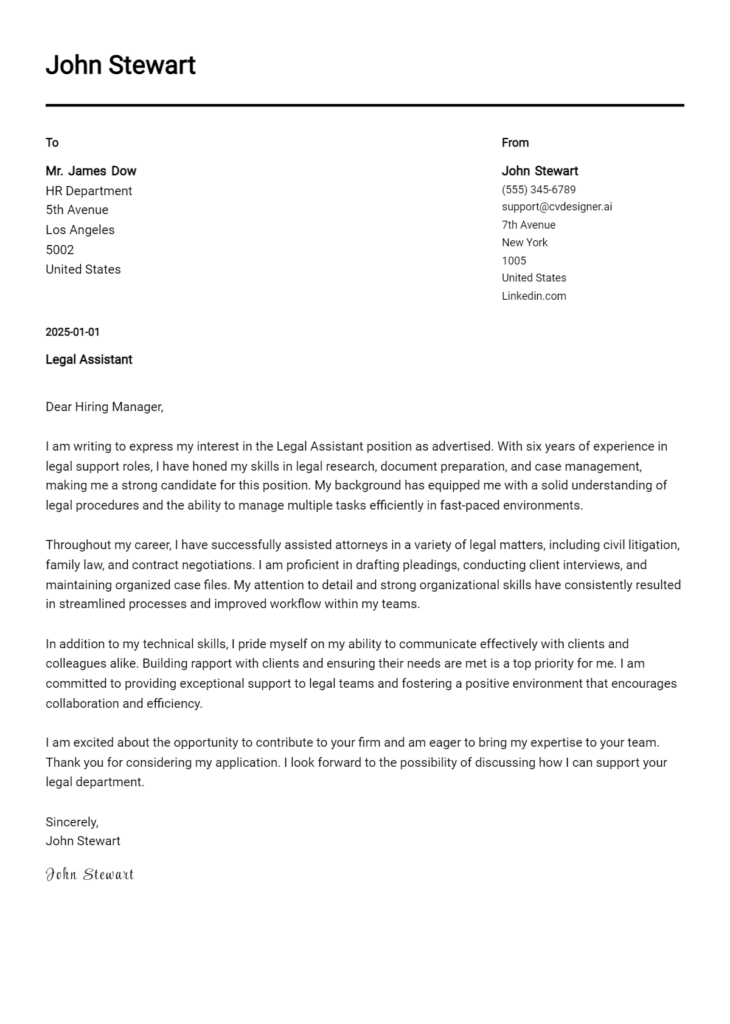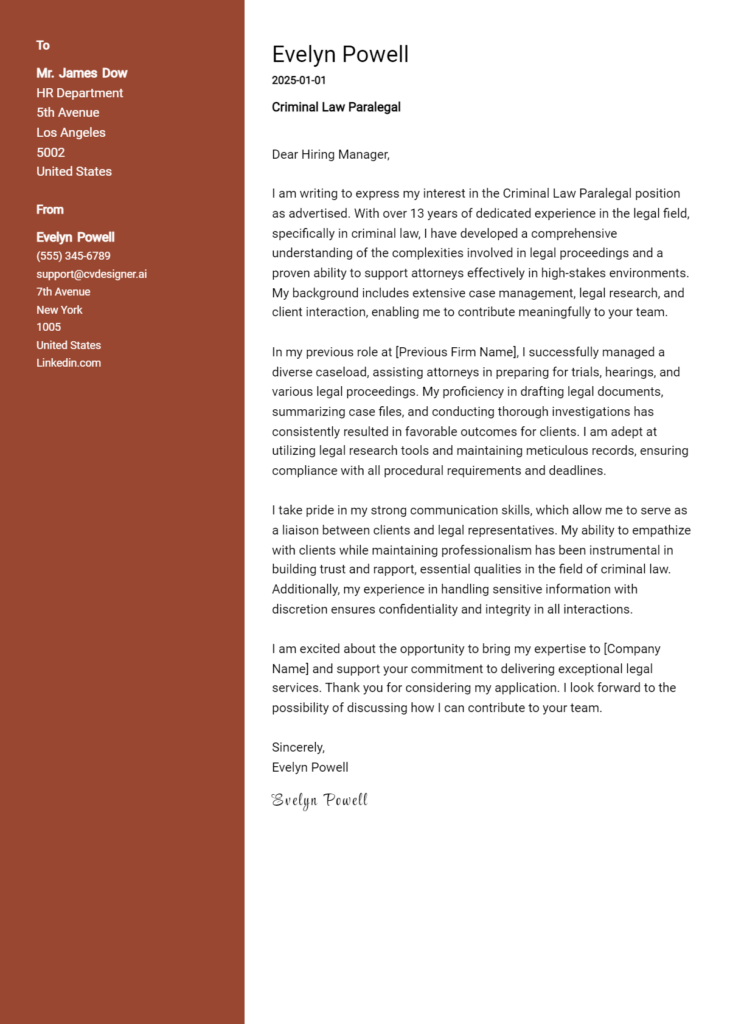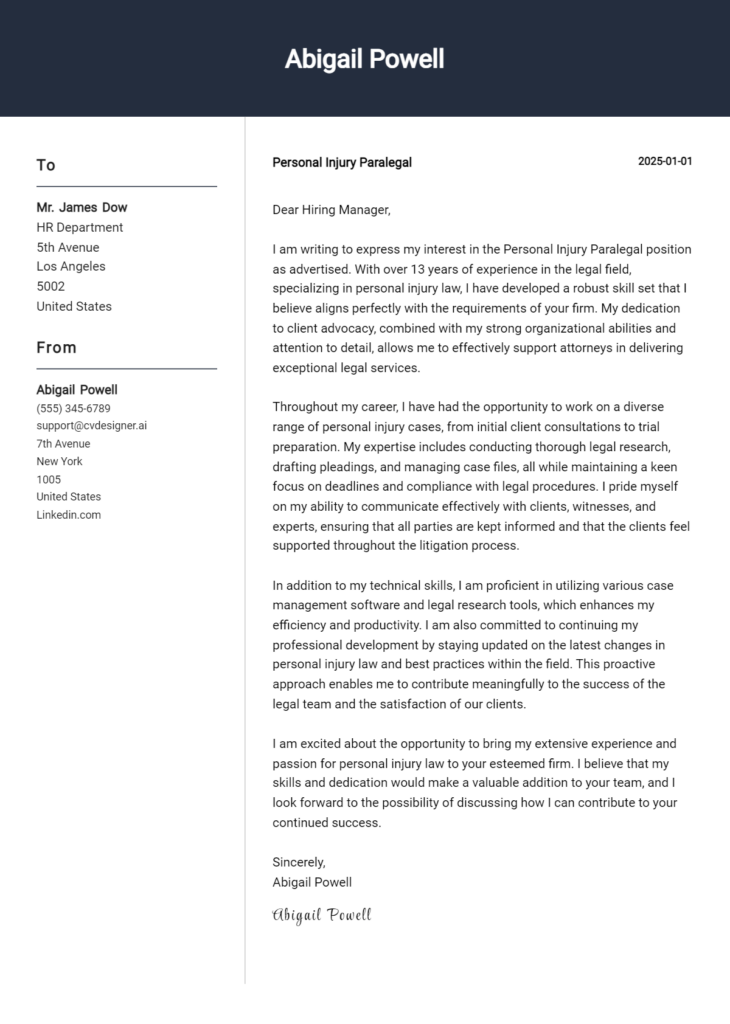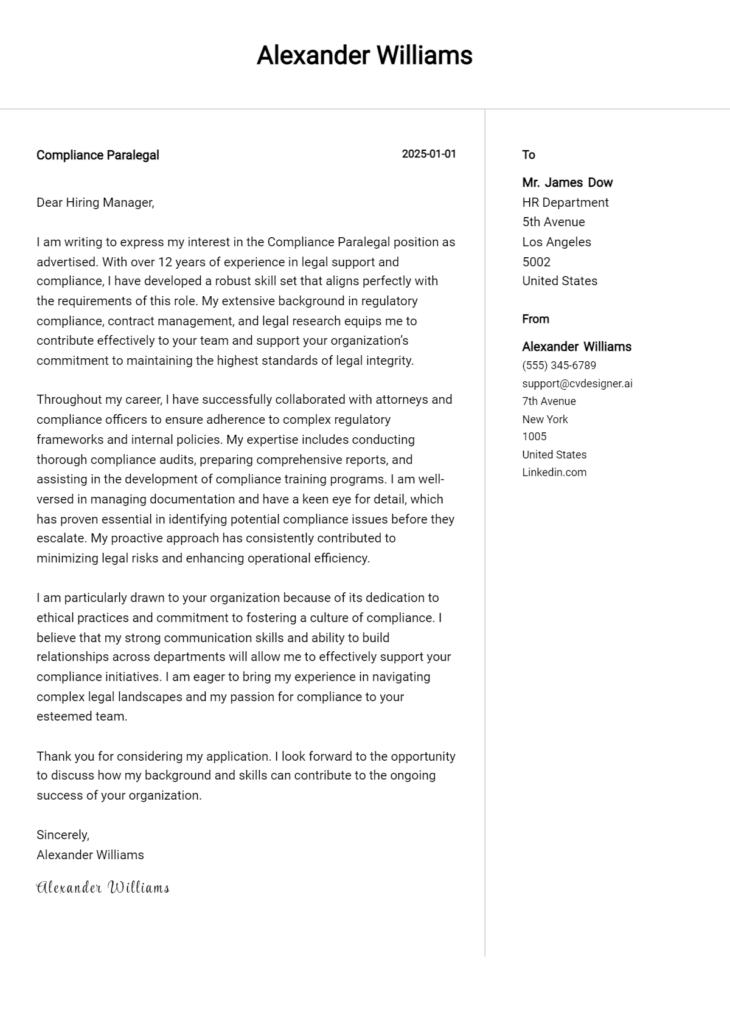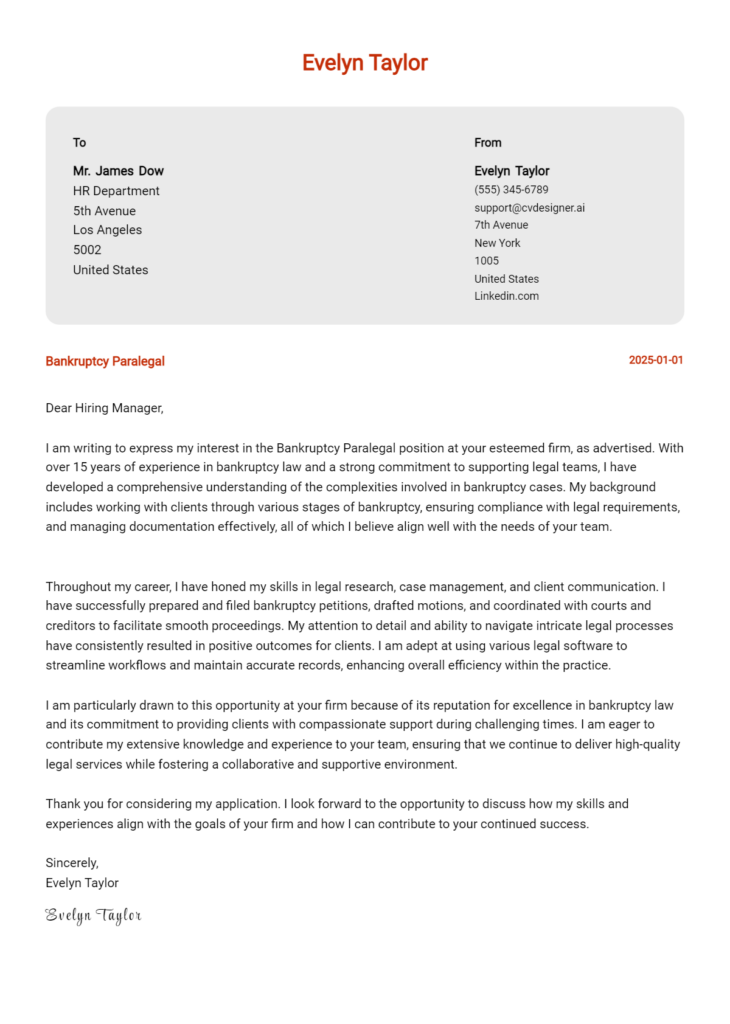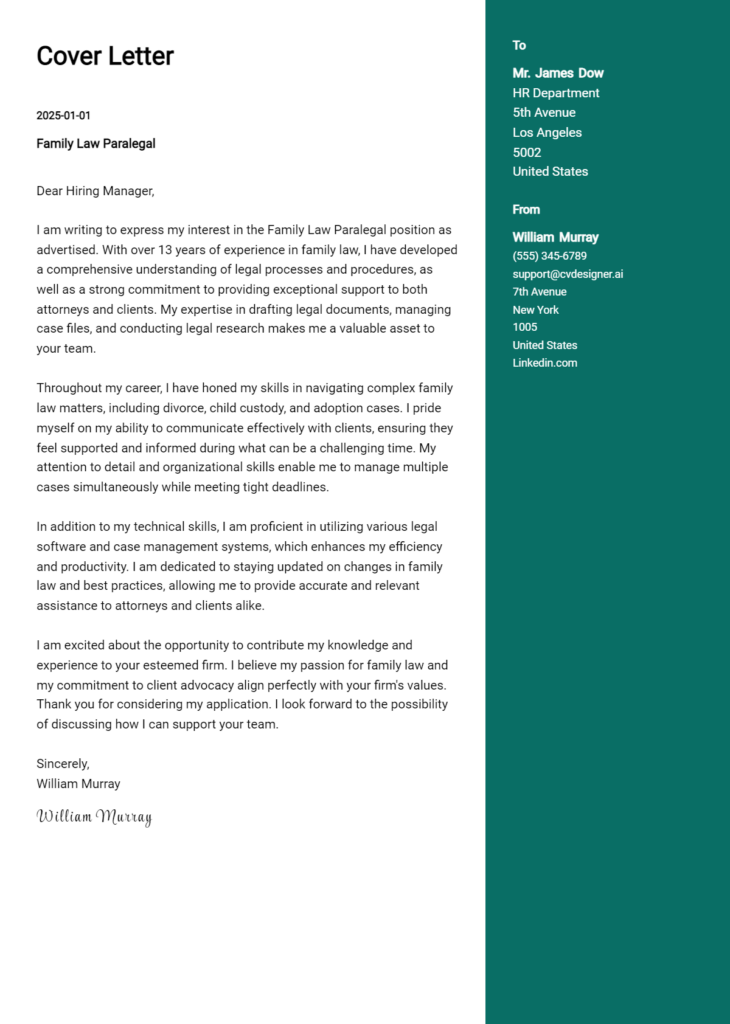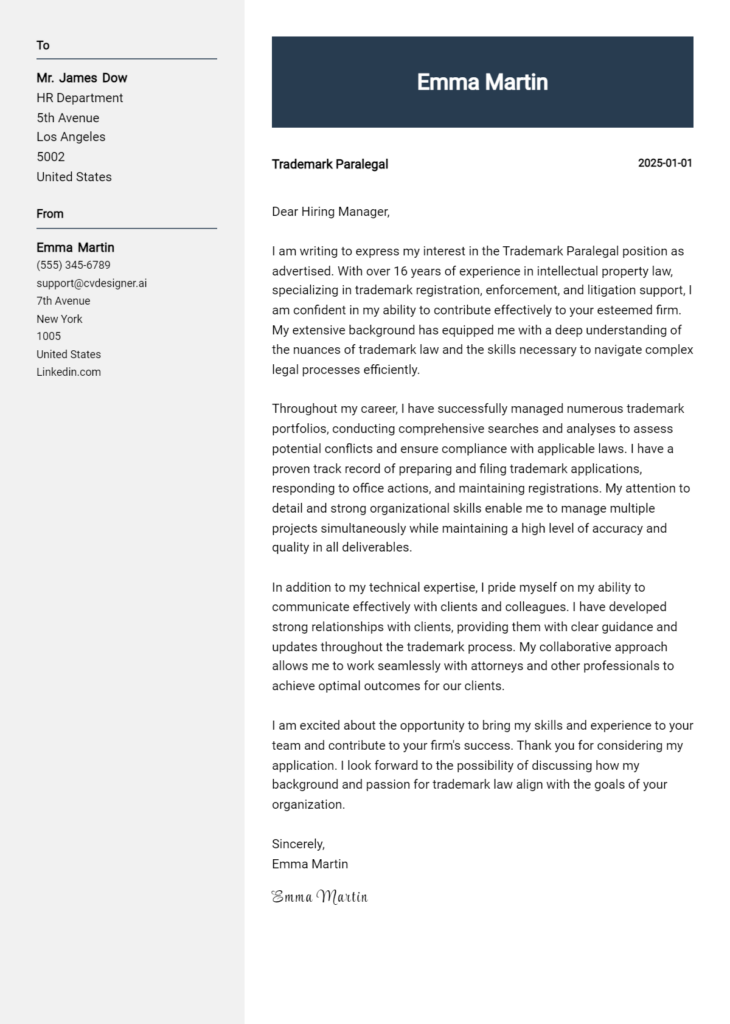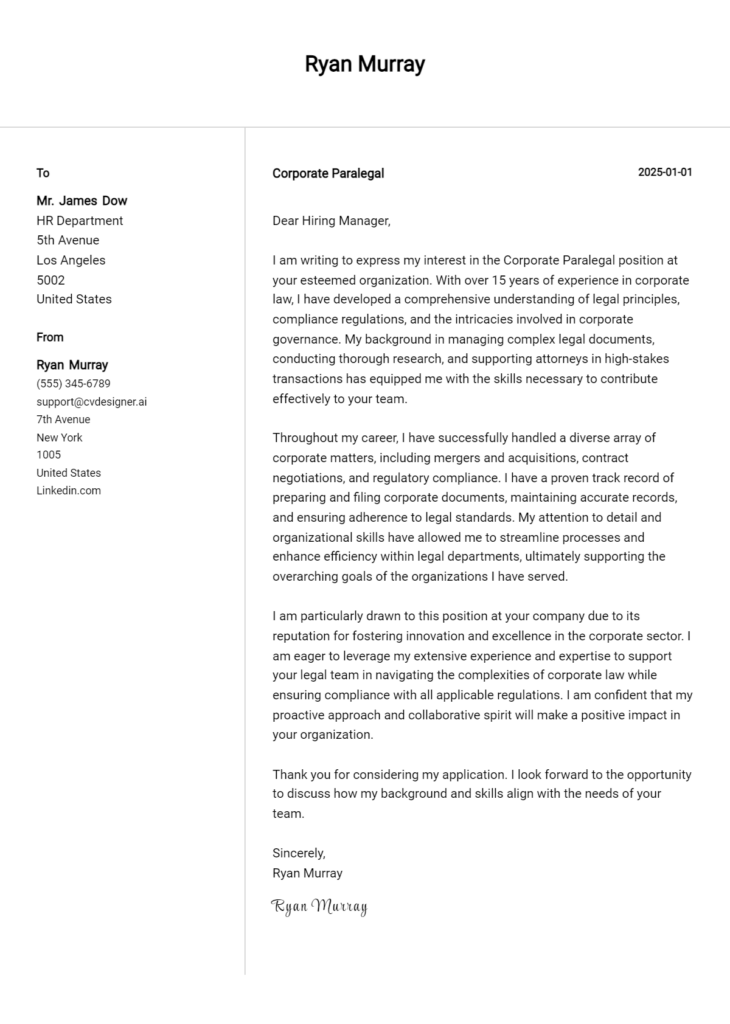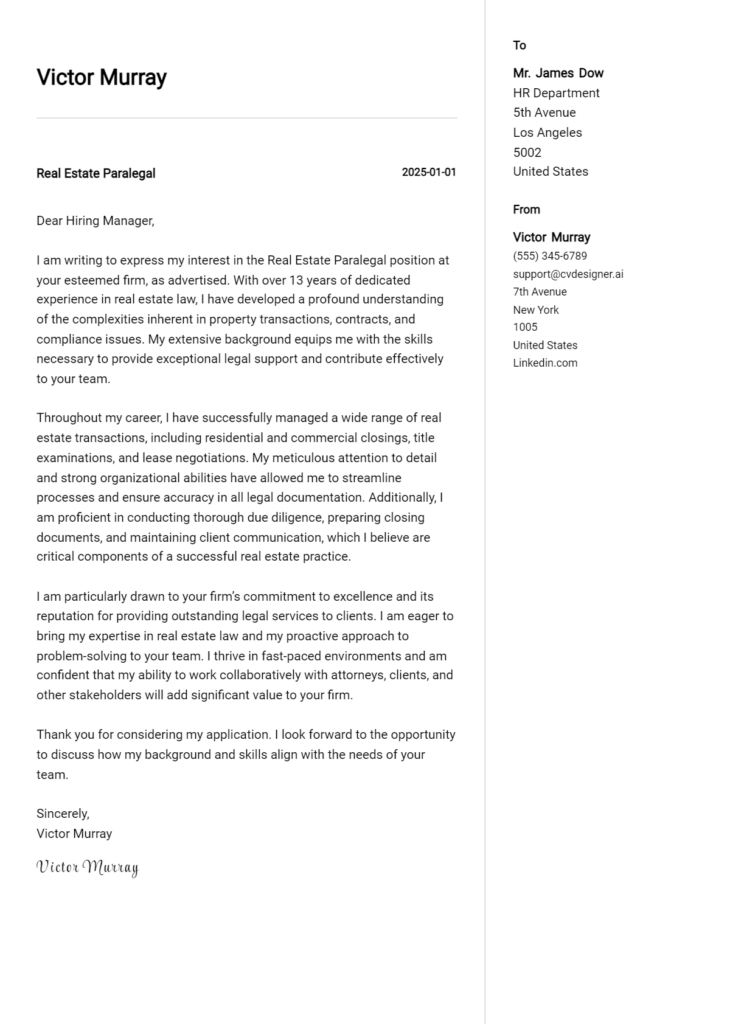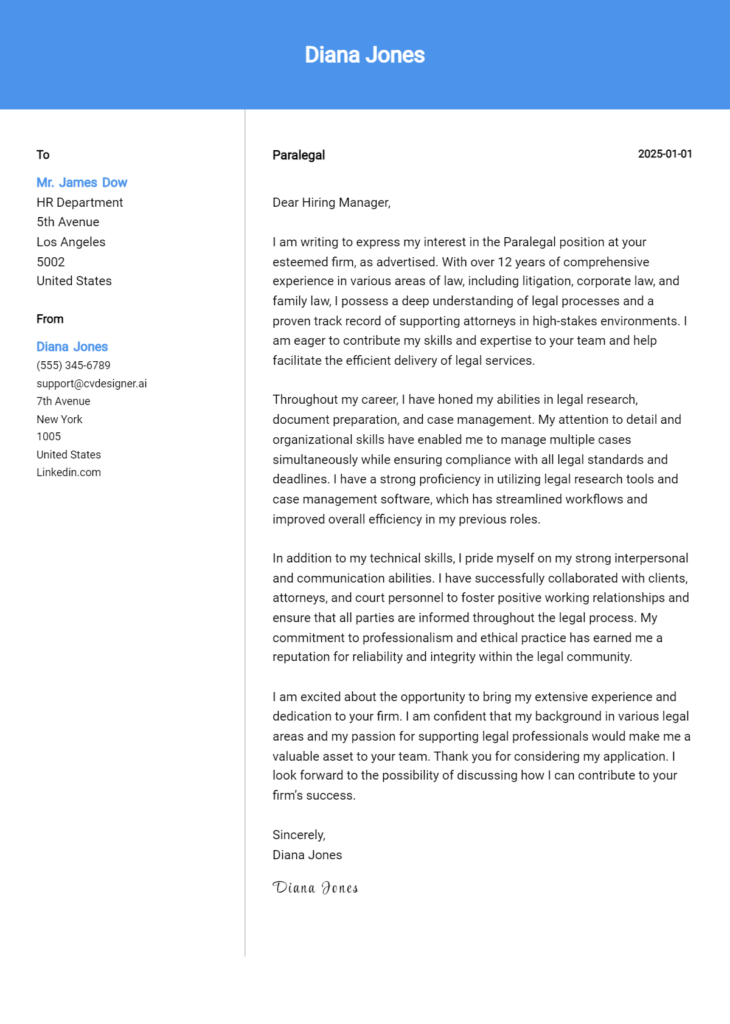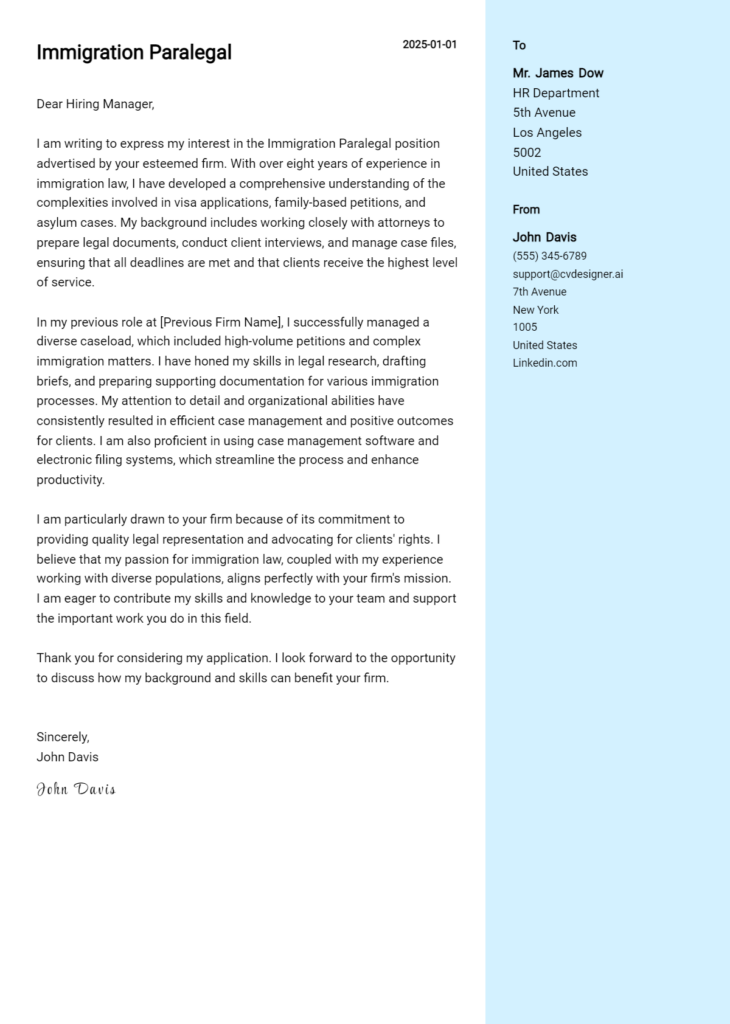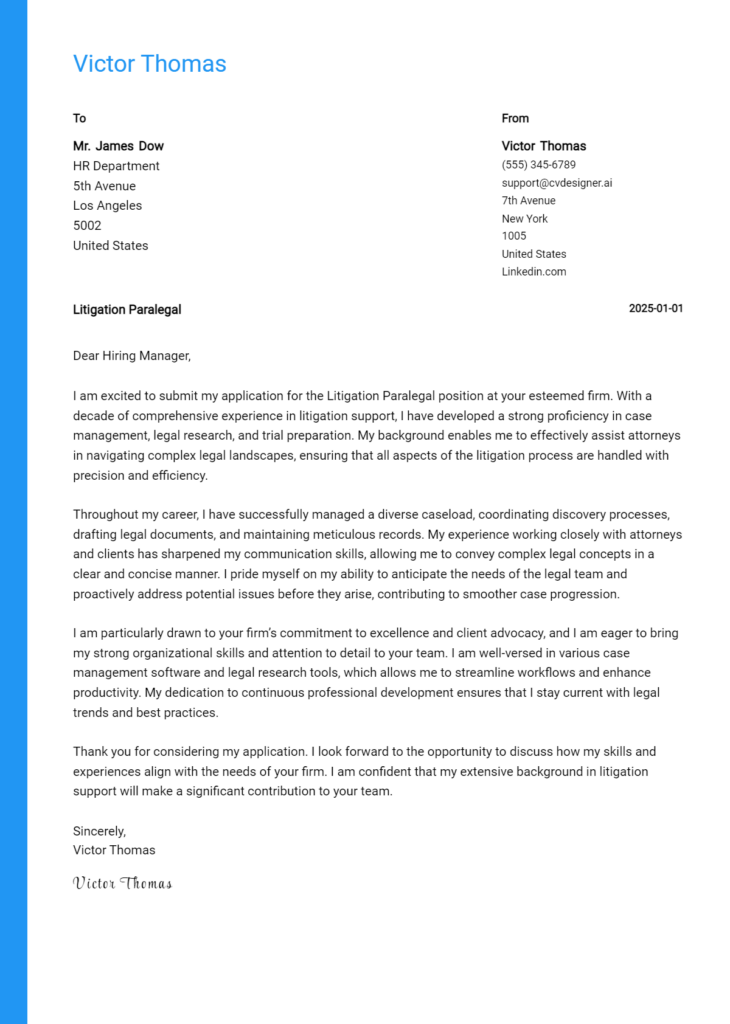Intellectual Property Paralegal Cover Letter Examples
Explore additional Intellectual Property Paralegal cover letter samples and guides and see what works for your level of experience or role.
How to Format an Intellectual Property Paralegal Cover Letter
Crafting a compelling cover letter is essential for aspiring Intellectual Property Paralegals, as it serves as your first opportunity to make a strong impression on potential employers. The format of your cover letter not only showcases your qualifications but also reflects your understanding of the nuances of intellectual property law. A well-structured cover letter helps demonstrate your attention to detail, organizational skills, and professionalism—qualities that are crucial in this field.
In this guide, we’ll outline how to structure your cover letter effectively, providing insights and examples tailored to the paralegal profession.
We’ll focus on the essential components of a professional cover letter, including:
- Cover Letter Header,
- Cover Letter Greeting,
- Cover Letter Introduction,
- Cover Letter Body,
- Cover Letter Closing.
Each section is pivotal in emphasizing your qualifications and suitability for the role. Let’s break down each part to help you create an outstanding cover letter that stands out in the competitive field of intellectual property law.
Importance of the Cover Letter Header for an Intellectual Property Paralegal
The header of a cover letter is critical as it sets the tone for the entire document and showcases your attention to detail—an essential trait for an Intellectual Property Paralegal. A well-structured header should include your contact information, the date, and the recipient's details, ensuring clarity and professionalism. This format not only helps the hiring manager quickly identify who you are but also demonstrates your organizational skills, which are vital in managing intellectual property cases. A strong header can make a positive first impression, while a weak one may lead to confusion or overlook your application entirely.
Strong Example
Jane Doe 123 Main Street Cityville, ST 12345 jane.doe@email.com (123) 456-7890 March 1, 2024 Mr. John Smith Hiring Manager ABC Law Firm 456 Elm Street Townsville, ST 67890
Weak Example
Jane Doe jane.doe@email (123) 456-7890 March 1, 2024 To Whom It May Concern
The Importance of a Cover Letter Greeting
The greeting of your cover letter is crucial as it sets the tone for the rest of your application. A well-crafted greeting demonstrates professionalism and shows that you have taken the time to personalize your letter, which can make a significant impression on the hiring manager. By addressing the recipient directly, you establish a connection and convey your enthusiasm for the position. To avoid generic greetings such as "To Whom It May Concern," it is advisable to research the hiring manager's name, which can often be found on the company’s website or LinkedIn profile. This attention to detail reflects your commitment and can help you stand out in a competitive job market.
Strong Greeting Example
Dear Ms. Jane Smith,
Weak Greeting Example
To Whom It May Concern,
The Importance of a Well-Crafted Cover Letter Introduction for an Intellectual Property Paralegal
A compelling cover letter introduction is crucial for an Intellectual Property Paralegal as it sets the tone for the rest of the application. This initial paragraph should not only capture the hiring manager's attention but also express genuine interest in the position and highlight key skills or achievements that align with the role. A strong introduction can differentiate a candidate in a competitive job market, showcasing their enthusiasm and relevant expertise right from the start. Below are examples of what constitutes a strong and weak cover letter introduction.
Strong Example
Dear [Hiring Manager's Name], I am excited to apply for the Intellectual Property Paralegal position at [Company Name], as advertised on [Job Board/Company Website]. With over five years of experience in managing trademark portfolios and a proven track record of successfully assisting with patent applications, I am eager to bring my expertise in intellectual property law to your esteemed firm. My commitment to supporting innovative ideas and ensuring legal protection for clients aligns perfectly with [Company Name]'s mission to foster creativity and safeguard intellectual property rights.
Weak Example
To whom it may concern, I am applying for the Intellectual Property Paralegal job. I have some experience in law and think it would be a good fit for me. I can help with paperwork and other tasks related to intellectual property.
Purpose of the Cover Letter Body for an Intellectual Property Paralegal
The body of a cover letter for an Intellectual Property Paralegal serves as a crucial opportunity for the candidate to articulate their unique skills and experiences that align with the requirements of the position. This section should effectively showcase the candidate's expertise in intellectual property law, attention to detail, and ability to manage complex projects. By highlighting specific past projects or notable accomplishments, the candidate can demonstrate their value to the company and how they can contribute to its success. This personalized narrative not only establishes the candidate's qualifications but also reflects their enthusiasm for the role and the firm’s mission.
Strong Example
I have successfully managed numerous trademark applications for clients in the technology sector, resulting in a 90% approval rate. One notable project involved conducting extensive prior art searches and preparing comprehensive reports that helped a startup secure their first patent, ultimately leading to a successful funding round. My meticulous organizational skills and proactive communication with clients and legal teams have consistently resulted in streamlined processes and satisfied clients. I am eager to bring my expertise in IP law and my passion for innovation to your firm, contributing to your reputation for excellence in intellectual property management.
Weak Example
I have some experience in intellectual property law and have worked on a few projects. I believe I can help your firm because I am interested in the work you do. I have done some research on trademarks, and I am willing to learn more. I think I would be a good fit for the job, and I hope to discuss it further with you.
The Importance of the Cover Letter Closing for an Intellectual Property Paralegal
A compelling cover letter closing is crucial for an Intellectual Property Paralegal application as it serves to summarize your qualifications, reiterate your enthusiasm for the role, and encourage the hiring manager to take the next steps. A strong closing can leave a lasting impression and prompt the reviewer to look more closely at your resume and consider scheduling an interview. Conversely, a weak closing may fail to convey your interest or qualifications, potentially leaving a negative impression.
Strong Example
Thank you for considering my application for the Intellectual Property Paralegal position. With my extensive experience in patent searches and trademark filings, coupled with my passion for protecting intellectual property rights, I am excited about the opportunity to contribute to your esteemed firm. I look forward to the possibility of discussing my qualifications in further detail. Please feel free to review my attached resume, and I hope to hear from you soon to schedule an interview.
Weak Example
I hope you like my application. I have some experience with legal work and think I could do well in this position. Please look at my resume if you want. Thank you.
These tips will help candidates craft an effective cover letter for an Intellectual Property Paralegal position by emphasizing the necessary skills and attributes that employers seek. Showcasing your technical expertise, problem-solving abilities, and knowledge of the Software Development Life Cycle (SDLC) is crucial. Additionally, highlighting your capacity for teamwork and a genuine passion for continuous learning can set you apart from other candidates. Follow these tips to create a compelling cover letter that captures your qualifications and enthusiasm for the role.
Tips for Crafting Your Cover Letter
Highlight Your Technical Skills
As an Intellectual Property Paralegal, it’s essential to demonstrate proficiency in various technical areas, such as patent databases, legal research platforms, and document management systems. Be specific about the tools and software you are familiar with, and provide examples of how you have utilized these skills in past roles. This not only shows your competency but also your readiness to contribute effectively from day one.Showcase Problem-Solving Abilities
Employers look for candidates who can think critically and solve complex issues. In your cover letter, include anecdotes that illustrate how you've tackled challenges in previous positions. Whether it's resolving a dispute over intellectual property rights or navigating a complicated filing process, detailing your problem-solving experiences can highlight your analytical skills and resourcefulness.Demonstrate Knowledge of the SDLC
Understanding the Software Development Life Cycle (SDLC) is increasingly important in the realm of intellectual property, especially with technology-related patents. Mention any relevant experience you have with SDLC, including your familiarity with different phases such as requirements gathering, design, implementation, and maintenance. This knowledge can be a significant asset, showcasing your ability to deal with tech-related legal matters.Emphasize Teamwork and Collaboration
As a paralegal, you will often work closely with attorneys, clients, and other stakeholders. Highlight your ability to collaborate effectively within a team setting. Describe situations where you contributed to a team project, emphasizing communication skills and your role in achieving collective goals. Your ability to work well with others can make a strong impact on your hiring potential.Express Passion for Continuous Learning
The legal landscape, particularly in intellectual property, is constantly evolving. Show your commitment to staying updated on industry trends, new technologies, and legal precedents. Mention any courses, certifications, or workshops you've completed or are planning to undertake. This demonstrates your proactive approach to professional development and your eagerness to grow within the field.
By incorporating these elements into your cover letter, you can create a compelling narrative that not only showcases your qualifications but also your enthusiasm for the role. If you need further assistance, consider exploring cover letter templates or utilizing a cover letter builder to streamline your writing process.
Common Mistakes to Avoid in an Intellectual Property Paralegal Cover Letter
Avoiding common mistakes in your cover letter is crucial for making a strong impression as an Intellectual Property Paralegal candidate. A well-crafted cover letter can set you apart from other applicants, while errors can undermine your qualifications and professionalism. Here are some common pitfalls to watch out for:
Generic Content: Many applicants use the same cover letter for multiple applications. Tailor your letter to highlight your specific skills and experiences related to intellectual property law.
Spelling and Grammar Errors: Typos can be detrimental in a profession where precision is key. Always proofread your letter or ask someone else to review it before submission.
Lack of Specific Examples: Failing to provide concrete examples of your relevant experience can weaken your case. Use specific instances that demonstrate your skills in handling intellectual property matters.
Ignoring the Job Description: Not aligning your cover letter with the job description can show a lack of attention. Refer to the skills and qualifications mentioned in the posting and illustrate how you meet them.
Overly Formal Language: While professionalism is important, overly formal language can come off as stiff. Aim for a friendly yet professional tone that reflects your personality.
Missing Contact Information: Ensure your contact details are clearly provided and easy to find. This makes it easier for potential employers to reach out to you.
Neglecting to Include a Call to Action: Ending your letter without a clear call to action may leave employers unsure of your enthusiasm. Finish with a statement expressing your eagerness to discuss your candidacy further.
For more insights on creating an effective cover letter, check out these cover letter examples and explore proper cover letter format to enhance your application.
Cover Letter FAQs for Intellectual Property Paralegal
What should I include in my cover letter for an Intellectual Property Paralegal position?
Your cover letter should begin with a strong opening that grabs attention, followed by a brief introduction of your background in law and specific experience in intellectual property. Highlight relevant skills such as research, attention to detail, and familiarity with patent and trademark processes. Be sure to mention any relevant education, certifications, or prior work experience that specifically pertains to intellectual property law. Conclude with a strong closing statement that reiterates your enthusiasm for the role and your intention to contribute to the firm’s success.
How can I tailor my cover letter for a specific job application?
To tailor your cover letter, carefully read the job description and identify key responsibilities and required skills. Use specific language and examples from your experience that align with these requirements. For instance, if the job emphasizes patent research, describe instances where you conducted thorough patent searches or assisted in drafting patent applications. Incorporate the company’s values or mission statement into your letter to show that you understand their objectives and culture. This customization demonstrates your genuine interest in the position and increases your chances of standing out.
How long should my cover letter be?
Your cover letter should ideally be one page long, consisting of three to four paragraphs. Aim for around 250 to 400 words. This length allows you to succinctly present your qualifications without overwhelming the reader. Use concise sentences and bullet points if necessary to highlight key achievements or skills. Ensure that each paragraph serves a purpose: the introduction captures attention, the body details your relevant experience, and the conclusion expresses enthusiasm and a desire for further discussion. Brevity is key, so be direct and focused.
Should I include my salary expectations in the cover letter?
It is generally advisable to avoid discussing salary expectations in your cover letter unless the job listing explicitly requests this information. Instead, focus on your skills, qualifications, and what you can bring to the role and the firm. If the topic arises during an interview or if the employer directly asks for your expectations, be prepared to discuss it then. Emphasizing your value and the unique contributions you can make allows you to negotiate from a position of strength later in the hiring process.
Build your Cover Letter in minutes
Use an AI-powered cover letter builder and have your letter done in 5 minutes. Just select your template and our software will guide you through the process.

